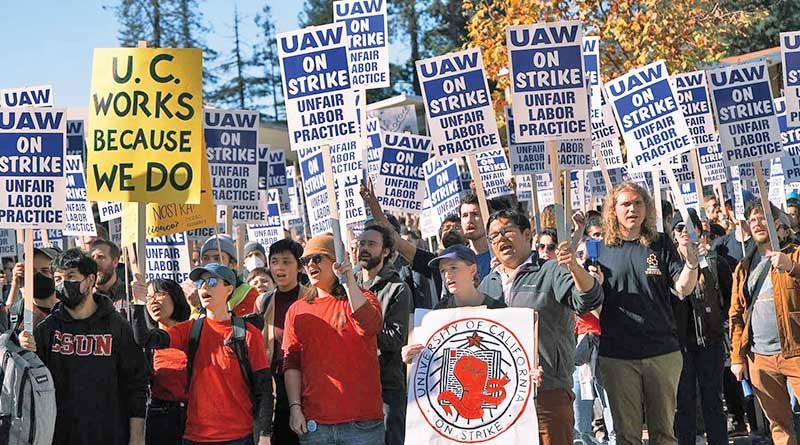Workers across UC strike for livable wages
By Sheri Williams
Student workers across the University of California system went on strike on November 14 to fight for livable wages.
The strike is the largest in U.S. history to hit higher education.
About 48,000 workers from multiple unions and locals including United Auto Workers 2865, UAW 5810 and Student Researchers United-UAW have walked out of classrooms and labs at every campus of the UC system, effectively shutting down many classes as the end of the semester nears. As the Labor Bulletin went to press, the strike has been ongoing for four weeks.
“We are fighting for a UC where first-generation scholars do not have to go into extreme debt so that highly-paid administrators can live in publicly-funded mansions. We are fighting for a UC in which workers are free from harassment and discrimination and earn enough money to live without excessive rent burden. We are fighting for a UC in which parents can raise their families without working second jobs, and everyone has access to sustainable and affordable transportation options. In short, we are fighting for a UC that works for its students and workers,” the strikers wrote in a joint statement.
The UAW, which represents about 36,000 teaching assistants, tutors, postdoctoral scholars and graduate student researchers, is bargaining for pay increases to help workers live where their jobs are. In many areas with UC campuses, salaries are not high enough to meet the cost of rent.
The most common salary for graduate workers is about $23,000, according to the unions. Some strikers have said the low pay forces them to live in their cars, or that they are homeless despite working full time for the UC system.
“We’re still facing wages that absolutely do not match the cost of living in the cities that our UC campuses are based in and we really feel that,” said Sarah Arveson, a postdoctoral researcher at UC Berkeley and vice-president of UAW Local 5810.
The union is also demanding better support for childcare and healthcare, along with aid for transportation costs and international students.
Two bargaining units involved in the strike reached a tentative deal with UC but will not return to work until the strike is over, standing in solidarity with their union sisters and brothers. The members of those units are postdoctoral employees and academic researchers, about 12,000 workers in all. The tentative agreement would raise their minimum pay for full time work nearly 30%, from about $55,000 to $70,000 over a five-year period. The majority of that increase, about $12,000, would come by next October.
The tentative deal would also double family leave to eight weeks and give a $2,500 childcare subsidy to postdoctoral workers. Postdoctoral workers would also receive longer initial appointments, two years instead of one, to provide greater stability. This is of particular concern for international student workers.
The strike has drawn national attention, with politicians including Bernie Sanders weighing in.
“I stand in strong solidarity with the 48,000 academic workers at the University of California who are on strike for higher wages, better childcare benefits, and expanded paid leave,” Sanders wrote on Twitter.
